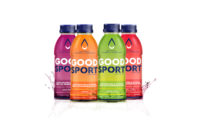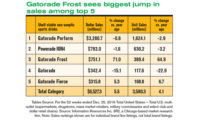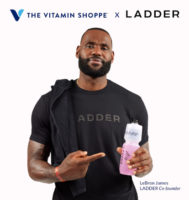Milk long has been known to have nine essential nutrients. But according to the Washington, D.C.-based Milk Processor Education Program (MilkPEP), new research examined by FDA and a review of the dietary reference intakes (DRIs) by the National Academies of Sciences, Engineering and Medicine show that milk is also a good source of zinc, potassium and selenium and an excellent source of iodine.
With these vital nutrients, milk now can claim 13 essential nutrients, MilkPEP said. That reality pushes the beverage to a natural nutrient content level that few other single foods or beverages can compete with – even formulated sports drinks.
Milk has fueled athletes for centuries and, especially now with these upgraded nutrition credentials, stands alone as the original sports drink, delivering a powerful combination of natural nutrients that aid muscle repair, rehydration and replenishment, while also helping to build strong bones and support immune health, MilkPEP said.
A side-by-side comparison of the nutrient makeup of milk and sports drinks reveals milk's nutrient package. Milk provides 13 nutrients and has only three ingredients (milk, vitamins A and D), while typical sports drinks contain as many as 12 ingredients, including added sugars, flavors and colors, MilkPEP said. Milk delivers a nutrient package that athletes and fitness enthusiasts of all ages need, including many not found in formulated sports drinks:
- A natural source of high-quality protein to build, repair and maintain lean muscle.
- Vitamin A, zinc and selenium to support a healthy immune system.
- Four B vitamins — riboflavin (B2), niacin (B3), pantothenic acid (B5) and vitamin B12 —to help convert food into energy.
- Calcium, vitamin D, phosphorus and protein to build and maintain strong bones and reduce the risk for stress fractures.
- Iodine to help regulate metabolism.
- Potassium to help maintain normal muscle function and regulate the balance of fluids in the body (based on the 2019 DRI for potassium established by National Academies of Sciences, Engineering and Medicine).
"Milk has always been and continues to be a staple item in my fridge,” said Briana Butler, MCN, RDN, LD, a performance and sports dietitian who advises athletes. “It fueled me throughout my athletic career from youth to pro, and now helps me to fuel my pro athlete husband and our growing athlete kids! The science and firsthand experience was already enough to recommend milk for athletic performance, but I'm excited to have a few more reasons to add to the arsenal.”
Butler often reminds her clients that nine out of 10 U.S. Olympians say they grew up drinking milk (based on 616 responses received to a survey sent to all U.S. Olympic athletes in 2020) and uses that fact as way to remind her clients of the beverage's power as a nutrient-rich aid to performance, MilkPEP said.
Milk is a natural choice when it comes to electrolytes, providing many of the same electrolytes that are added to many commercial recovery drinks (calcium, potassium, sodium and magnesium), along with fluids that help rehydrate.
"Nutritionists, trainers, Olympic athletes and fitness enthusiasts have long known about the nutritional power of milk," said Yin Woon Rani, CEO of MilkPEP. "With 13 performance-fueling nutrients, milk's got even more reasons to claim its rightful position as the original sports drink. With the world's best athletes coming together in Tokyo in just a few months, we're going to see milk's power on the podium, just as we've seen for centuries."



